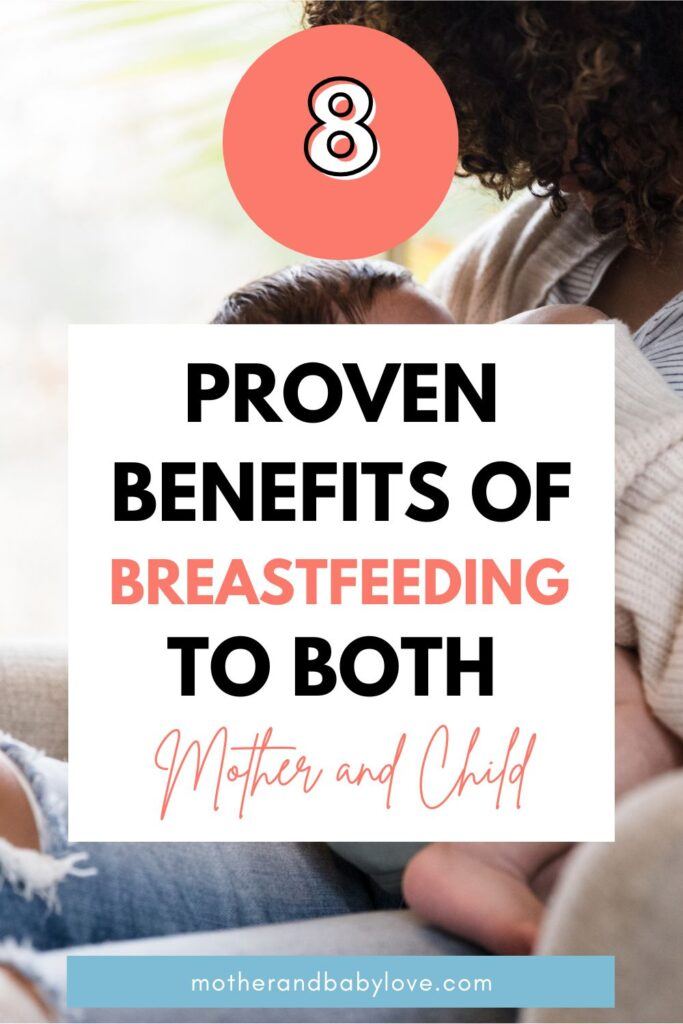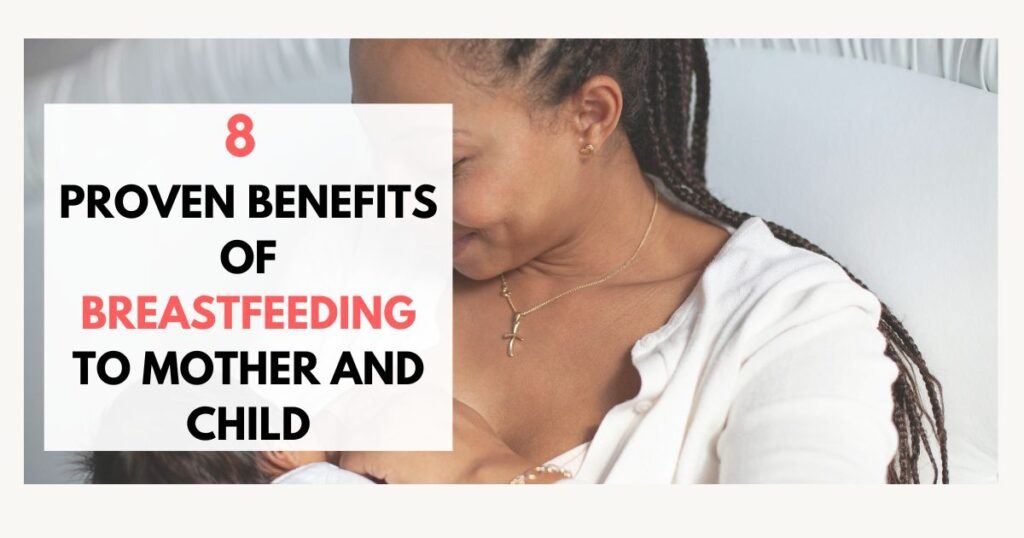Breastfeeding is easy.
This is a very common myth about breastfeeding. On the contrary, it seems simple but it is not easy. Ask a mom who has breastfed. Mothers choose to breastfeed because of the immense benefits of breastfeeding to both them and the baby.
The World Health Organization (WHO) recommends that infants be exclusively breastfed from birth until six months. This means without feeding them anything else. Afterward, they should be introduced to complementary foods while still being breastfed until they are two years or older.
Babies should be breastfed as often as they want, day and night.
You may be wondering if it’s easier to just give your baby formula. Before you make a decision, allow me to share why breastfeeding is important. To you and your baby as well.
Related:4 Reasons To Start Pumping Breast Milk Even If You Are Exclusively Breastfeeding
Benefits of Breastfeeding to the Baby
1. Breastmilk is perfectly balanced for the baby.
Breastmilk contains all the nutrients infants need for the first six months. Moreover, these nutrients are in the right proportion. The composition even changes to suit the baby’s needs, especially during its first month.
Immediately after birth, the breast produces a thick, yellowish fluid called colostrum. It’s rich in protein, low in sugar, and has beneficial compounds in huge amounts.
Colostrum is the ideal first milk and helps the baby’s underdeveloped digestive system to develop.
This is why healthcare professionals advise mothers to breastfeed their babies.
2. Breastfeeding reduces the risk of diseases.
Research has shown that exclusively breastfed babies have stronger immunity than those who are not. Breastfeeding shares the mother’s antibodies with the baby. These antibodies help the baby develop a good immune system and protect them from illnesses by fighting viruses and bacteria.
Colostrum, in particular, contains high amounts of immunoglobulin A (IgA) and several other antibodies.
Breastfeeding protects your baby against diseases such as cold infections, gut infections, respiratory tract infections, sudden infant death syndrome (SIDS), diabetes, bowel diseases, childhood leukaemia, and many more.
3. Breastfeeding promotes healthy weight for babies.
A breastfed baby healthily gains weight and has a reduced risk of childhood obesity.
This study showed that breastfeeding for at least four months significantly reduced the risk of babies being overweight or obese.
Breastfed babies have more leptin in their systems than formula-fed babies. Leptin is an essential hormone for regulating appetite and fat storage.
Science also suggests that breastfeeding helps a baby’s gut develop different bacteria. These bacteria may positively affect fat storage.
It is also important to note that breastfeeding helps babies develop healthy eating habits. Breastfeeding babies regulate their food intake more easily than babies who feed on formula. When a baby breastfeeds, they know to stop when they have satisfied their hunger.
4. Breastfed children may be more intelligent than formula-fed ones.
Certain studies suggest a difference in brain development between babies who breastfeed and those who feed on formula.
The physical intimacy, touch, and contact may cause the difference, not to mention the nutrients acquired by the baby.
Related: 8 Breastfeeding Essentials Every New Mom Should Have
Benefits of Breastfeeding to the Mother
5. Breastfeeding helps in the reduction of the size of the uterus.
After delivery, a mother’s uterus begins shrinking to its original size. This process is known as involution. Oxytocin, a hormone secreted during pregnancy, helps in this process.
The body produces high oxytocin levels during labour to help deliver the baby and reduce bleeding. Oxytocin also helps the mother bond with their baby.
Oxytocin levels also increase during breastfeeding and help with uterine contractions to restore the uterus to its original size.
Studies have shown that breastfeeding mothers have a faster involution process than those who don’t.
6. Breastfeeding may help mothers lose weight.
Nursing mothers burn more calories. This helps to lose the extra weight gained during pregnancy. After three months of breastfeeding, a mother may have increased fat-burning components in their body.
7. Mothers who breastfeed have a lower risk of developing postpartum depression.
Mothers are prone to postpartum depression (PPD) immediately after birth. The birth of a baby may result in a myriad of emotions, such as joy, fear, or anxiety, which may eventually lead to stress.
Research suggests that mothers who do not breastfeed or wean early are at higher risk of developing PPD than those who breastfeed.
However, mothers who develop depression immediately after delivery may find breastfeeding difficult. One should seek medical help immediately if one notices any sign of PPD.
8. Breastfeeding saves time and money.
This is arguably one of the biggest benefits of breastfeeding. Breastmilk is always available for free and at the right temperature for the baby.
When you breastfeed, you do not have to:
- Spend money on formula, pumps, or bottles
- Calculate how much milk the baby needs or in what proportions
- Spend precious time cleaning and sterilizing bottles
- Mix and warm bottles, whether during the day or night
- Figure out how to carry and warm bottles while on the go
Takeaway
Breastfeeding has immense benefits for the mother and baby. This is why professionals advise mothers to breastfeed their babies from birth until at least one year. A nursing mother should find ways to get comfortable to ensure that both she and the baby reap maximum benefits from this extraordinary experience.
Regardless of a mother’s choice, she can be guided by healthcare professionals toward the right choices and methods.




